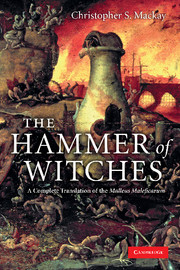Book contents
- Frontmatter
- Dedication
- Contents
- Map
- Introduction
- THE HAMMER OF WITCHES
- Structure of the text
- Author's Justification of the “Hammer for Sorceresses”
- Text of the Apostolic Bull
- Approbation and Signatures of the Doctors of the Illustrious University of Cologne
- PART I
- Question 1
- Question 2
- Question 3
- Question 4
- Question 5
- Question 6
- Question 7
- Question 8
- Question 9
- Question 10
- Question 11
- Question 12
- Question 13
- Question 14
- Question 15
- Question 16
- Question 17
- Question 18
- PART II
Question 14
from PART I
Published online by Cambridge University Press: 05 August 2015
- Frontmatter
- Dedication
- Contents
- Map
- Introduction
- THE HAMMER OF WITCHES
- Structure of the text
- Author's Justification of the “Hammer for Sorceresses”
- Text of the Apostolic Bull
- Approbation and Signatures of the Doctors of the Illustrious University of Cologne
- PART I
- Question 1
- Question 2
- Question 3
- Question 4
- Question 5
- Question 6
- Question 7
- Question 8
- Question 9
- Question 10
- Question 11
- Question 12
- Question 13
- Question 14
- Question 15
- Question 16
- Question 17
- Question 18
- PART II
Summary
[TT] REGARDING the heinousness of the crimes, it is asked whether the criminal deeds of the sorcerers surpass all the evil things that God permits and has permitted to happen from the beginning of the world until the present day, both in terms of instances of guilt and penalties and losses.
[AG 1] It seems that this is not so, particularly in terms of guilt. A sin committed by someone that he could easily have avoided surpasses the sin committed by someone else that he could not have so easily avoided. This is made clear | by Augustine [City of God 14.15]: “The iniquity in sinning is great when there is such ease in not sinning.” Adam and many who sinned in a state of perfection (Grace) could have more easily avoided their sins through the presence of Grace (especially in the case of Adam, who had been created in Grace) than could many sorcerers, who did not receive gifts of this kind. Therefore, their sins surpass all the crimes of the sorcerers.
[AG 2] Also, in terms of penalty, a greater penalty is owed for a greater instance of guilt, and the sin of Adam was punished most severely, in that, as is clear, the penalty, along with the guilt, is shown to harm all his descendants in reference to the transference of original sin. Therefore, his sin is more serious than all other sins.
[AG 3] Also, in terms of loss. According to Augustine, “This is something evil because it removes a good thing” (City of God [14:15]). Therefore, when more good is lost, the guilt that precedes is greater. The sin of the First Ancestor inflicted a greater loss in aspects of both nature and Grace, when it deprived us of innocence and immortality, which | was inflicted by no sin of his descendants. Therefore, and so on.
- Type
- Chapter
- Information
- The Hammer of WitchesA Complete Translation of the Malleus Maleficarum, pp. 227 - 236Publisher: Cambridge University PressPrint publication year: 2009

